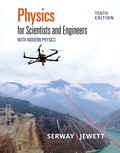
Physics for Scientists and Engineers with Modern Physics
10th Edition
ISBN: 9781337671729
Author: SERWAY
Publisher: Cengage
expand_more
expand_more
format_list_bulleted
Concept explainers
Question
Chapter 31, Problem 7P
To determine
The expression of self induced emf as a function of time.
Expert Solution & Answer
Trending nowThis is a popular solution!

Students have asked these similar questions
Consider the circuit shown in the figure. The battery has emf ε = 69 volts and negligible internal resistance. The inductance is L = 0.4 H and the resistances are R 1 = 12 Ω and R 2 = 9.0 Ω. Initially the switch S is open and no currents flow. Then the switch is closed. After leaving the switch closed for a very long time, it is opened again. Just after it is opened, what is the current in R 1?
A capacitor with a capacitance of C = 5.95×10−5 F is charged by connecting it to a 12.5 −V battery. The capacitor is then disconnected from the battery and connected across an inductor with an inductance of L = 1.55 H . At the time 2.35×10−2 s after the connection to the inductor is made, what is the current in the inductor? At that time, how much electrical energy is stored in the inductor?
Can someone help me with this question. Thanks.
Chapter 31 Solutions
Physics for Scientists and Engineers with Modern Physics
Ch. 31.1 - A coil with zero resistance has its ends labeled a...Ch. 31.2 - Prob. 31.2QQCh. 31.3 - Prob. 31.3QQCh. 31.4 - Prob. 31.4QQCh. 31.5 - (i) At an instant of time during the oscillations...Ch. 31 - Prob. 1PCh. 31 - Prob. 2PCh. 31 - Prob. 3PCh. 31 - Prob. 4PCh. 31 - Prob. 5P
Ch. 31 - A toroid has a major radius R and a minor radius r...Ch. 31 - Prob. 7PCh. 31 - Prob. 8PCh. 31 - Prob. 9PCh. 31 - Prob. 10PCh. 31 - Prob. 11PCh. 31 - Prob. 12PCh. 31 - Prob. 13PCh. 31 - You are working as a demonstration assistant for a...Ch. 31 - Prob. 15PCh. 31 - Prob. 16PCh. 31 - Prob. 17PCh. 31 - Prob. 18PCh. 31 - Prob. 19PCh. 31 - Prob. 20PCh. 31 - Prob. 21PCh. 31 - Prob. 22PCh. 31 - Prob. 23PCh. 31 - Prob. 24PCh. 31 - Prob. 25PCh. 31 - Prob. 26PCh. 31 - Prob. 27PCh. 31 - Prob. 28PCh. 31 - In the circuit of Figure P31.29, the battery emf...Ch. 31 - Prob. 30PCh. 31 - Prob. 31PCh. 31 - Prob. 32PCh. 31 - In Figure 31.15, let R = 7.60 , L = 2.20 mH, and C...Ch. 31 - Prob. 34PCh. 31 - Electrical oscillations are initiated in a series...Ch. 31 - Prob. 36APCh. 31 - A capacitor in a series LC circuit has an initial...Ch. 31 - Prob. 38APCh. 31 - Prob. 39APCh. 31 - At the moment t = 0, a 24.0-V battery is connected...Ch. 31 - Prob. 41APCh. 31 - Prob. 42APCh. 31 - Prob. 43APCh. 31 - Prob. 44APCh. 31 - Prob. 45APCh. 31 - At t = 0, the open switch in Figure P31.46 is...Ch. 31 - Prob. 47APCh. 31 - Prob. 48APCh. 31 - Prob. 49APCh. 31 - Prob. 50CPCh. 31 - Prob. 51CPCh. 31 - Prob. 52CPCh. 31 - Prob. 53CP
Knowledge Booster
Learn more about
Need a deep-dive on the concept behind this application? Look no further. Learn more about this topic, physics and related others by exploring similar questions and additional content below.Similar questions
arrow_back_ios
SEE MORE QUESTIONS
arrow_forward_ios
Recommended textbooks for you
 Principles of Physics: A Calculus-Based TextPhysicsISBN:9781133104261Author:Raymond A. Serway, John W. JewettPublisher:Cengage Learning
Principles of Physics: A Calculus-Based TextPhysicsISBN:9781133104261Author:Raymond A. Serway, John W. JewettPublisher:Cengage Learning
 Physics for Scientists and Engineers: Foundations...PhysicsISBN:9781133939146Author:Katz, Debora M.Publisher:Cengage Learning
Physics for Scientists and Engineers: Foundations...PhysicsISBN:9781133939146Author:Katz, Debora M.Publisher:Cengage Learning Physics for Scientists and Engineers with Modern ...PhysicsISBN:9781337553292Author:Raymond A. Serway, John W. JewettPublisher:Cengage Learning
Physics for Scientists and Engineers with Modern ...PhysicsISBN:9781337553292Author:Raymond A. Serway, John W. JewettPublisher:Cengage Learning College PhysicsPhysicsISBN:9781938168000Author:Paul Peter Urone, Roger HinrichsPublisher:OpenStax College
College PhysicsPhysicsISBN:9781938168000Author:Paul Peter Urone, Roger HinrichsPublisher:OpenStax College Physics for Scientists and Engineers, Technology ...PhysicsISBN:9781305116399Author:Raymond A. Serway, John W. JewettPublisher:Cengage Learning
Physics for Scientists and Engineers, Technology ...PhysicsISBN:9781305116399Author:Raymond A. Serway, John W. JewettPublisher:Cengage Learning

Principles of Physics: A Calculus-Based Text
Physics
ISBN:9781133104261
Author:Raymond A. Serway, John W. Jewett
Publisher:Cengage Learning


Physics for Scientists and Engineers: Foundations...
Physics
ISBN:9781133939146
Author:Katz, Debora M.
Publisher:Cengage Learning

Physics for Scientists and Engineers with Modern ...
Physics
ISBN:9781337553292
Author:Raymond A. Serway, John W. Jewett
Publisher:Cengage Learning

College Physics
Physics
ISBN:9781938168000
Author:Paul Peter Urone, Roger Hinrichs
Publisher:OpenStax College

Physics for Scientists and Engineers, Technology ...
Physics
ISBN:9781305116399
Author:Raymond A. Serway, John W. Jewett
Publisher:Cengage Learning